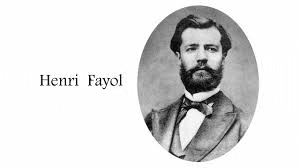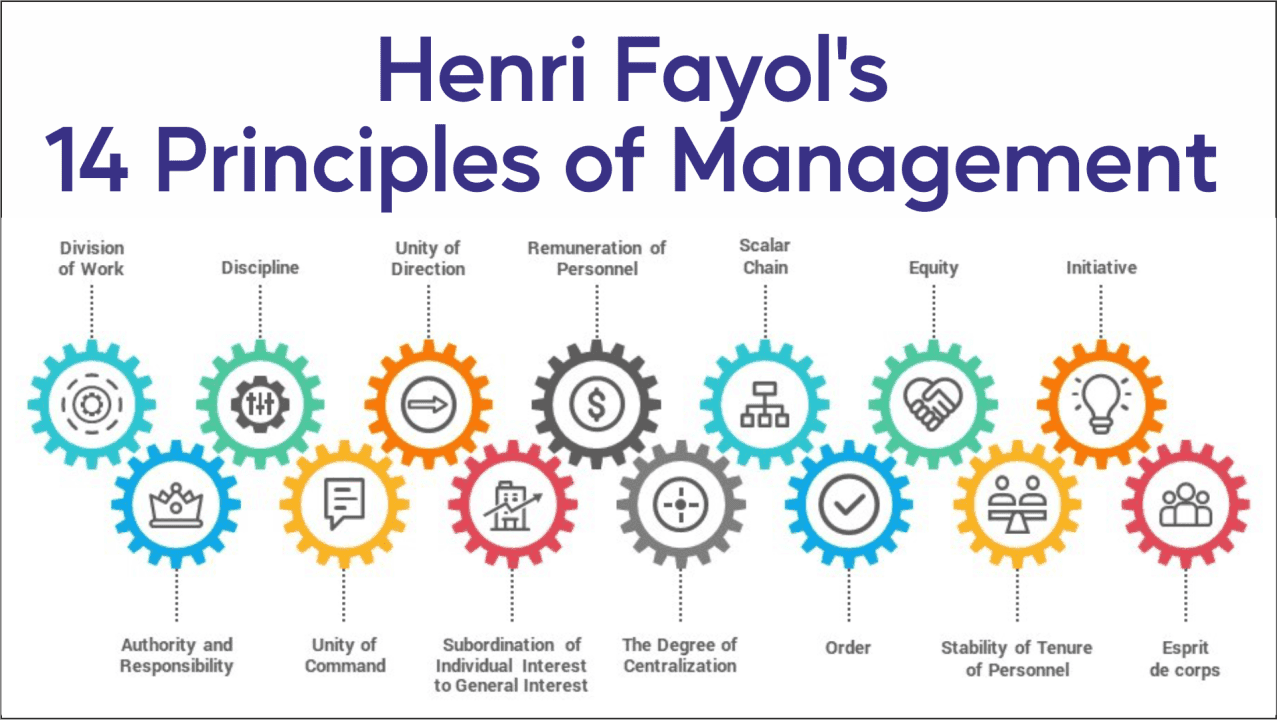Introduction to Henri Fayol and the Classical Approach

Henri Fayol was a French engineer who helped shape management ideas. Henri Fayol is known for explaining how to manage businesses better. The classical approach to management started in the late 1800s and early 1900s when industries were growing fast, showing the need for better ways to run companies. Henri Fayol’s ideas, like planning, organizing, leading, and controlling, are still important today and help guide how organizations are managed.
Henri Fayol’s administrative theory is about how to manage organizations effectively. It helps managers understand their main jobs, which include planning, organizing, leading, coordinating, and controlling. Fayol believed that good management is key to a successful business. He developed these ideas during a time when companies were getting bigger and needed better ways to run smoothly. His theory focuses on creating clear structures and processes to help managers guide their teams and make sure everything works well together. Overall, Fayol’s ideas provide a simple and useful way for managers to think about their roles and responsibilities in an organization.
Table of Contents
14 Principles of Management by Fayol

The 14 principles of management by Fayol are:
Division of Work: This means breaking down tasks so that workers can specialize in specific areas, leading to greater efficiency and productivity. When workers focus on what they do best, they can complete tasks faster and with better quality.
Authority and Responsibility: Managers should have the power to make decisions, but they must also be accountable for those decisions, creating a balance between authority and responsibility. This ensures that managers can lead effectively while being responsible for their actions.
Discipline: There should be respect for rules and agreements within the organization to maintain order and efficiency. Following rules helps everyone understand what is expected and keeps the workplace running smoothly.
Unity of Command: Each employee should report to only one manager to avoid confusion and ensure clear communication. This way, employees know exactly who to turn to for guidance and support.
Unity of Direction: All activities in the organization should be directed toward common goals, ensuring everyone is working together. When everyone is on the same page, it’s easier to achieve the organization’s objectives.
Subordination of Individual Interest: The interests of the organization should come before individual interests, promoting teamwork and collaboration. This helps create a strong team where everyone works for the common good.
Remuneration: Employees should receive fair pay based on their performance to motivate and reward them for their work. Fair pay encourages employees to put in their best effort and stay committed to their jobs.
Centralization: Decision-making should be balanced between top management and lower levels, allowing for both control and input from various levels of the organization. This balance helps ensure that decisions are informed by different perspectives.
Scalar Chain: There should be clear lines of communication from the top of the organization to the bottom, ensuring everyone knows who to report to. This clarity helps previent misunderstandings and keeps everyone informed.
Order: Resources and people should be organized in the right places to ensure efficiency and effectiveness in operations. Having everything in its place makes it easier for employees to do their jobs well.
Equity: Employees should be treated fairly and justly, fostering a positive work environment. Fair treatment helps build trust and loyalty among employees.
Stability of Tenure: Reducing employee turnover is important for maintaining efficiency and building a skilled workforce. When employees stay longer, they become more experienced and contribute more to the organization.
Initiative: Encouraging employees to take initiative and be innovative can lead to new ideas and improvements in the organization. When employees feel empowered to share their ideas, it can lead to positive changes.
Esprit de Corps: Promoting team spirit and a sense of belonging among employees helps create a positive and collaborative workplace culture. A strong team spirit makes work more enjoyable and encourages cooperation among colleagues.
Fayol’s Five Core Functions of Management
The Fayol’s five core functions of management are:
Planning: This function involves setting objectives and determining the best course of action to achieve them. Managers assess the current situation, forecast future conditions, and develop strategies to reach the organization’s goals.
Organizing: This function focuses on arranging resources, including people, finances, and materials, to implement the plans. Managers create a structure for the organization, defining roles and responsibilities to ensure that tasks are completed efficiently.
Leading: This function is about guiding and motivating employees to work effectively towards the organization’s goals. Managers communicate clearly, inspire their teams, and foster a positive work environment to encourage productivity and engagement.
Controlling: This function involves monitoring progress and performance to ensure that the organization is on track to meet its goals. Managers evaluate outcomes, compare them to the plans, and make necessary adjustments to stay aligned with objectives.
Coordinating: This function ensures that all parts of the organization work together harmoniously. Managers facilitate communication and collaboration among different departments to achieve common goals and enhance overall efficiency.
Comparison of Fayol’s Theory with Taylor’s Scientific Management
1. Focus and Approach
- Fayol’s Theory: Fayol looks at management as a whole. He talks about the main jobs of managers, like planning, organizing, leading, and controlling, to help the entire organization run well.
- Taylor’s Scientific Management: Taylor focuses on improving how individual tasks are done. He studies work processes to find the best ways to do tasks and make workers more productive.
2. Management Principles
- Fayol’s Theory: Fayol created principles that apply to all managers. These include ideas like dividing work, balancing authority and responsibility, and having clear rules, which help managers do their jobs better.
- Taylor’s Scientific Management: Taylor introduced ideas to make work more efficient, like standardizing tasks and using time studies to see how long tasks take. He focuses on getting the most output from workers.
3. View of Workers
- Fayol’s Theory: Fayol sees workers as important parts of the organization. He believes good leadership and communication are key to motivating employees and encouraging teamwork.
- Taylor’s Scientific Management: Taylor sees workers mainly as resources to be used efficiently. His methods often treat workers like machines, focusing more on their output than on their needs or feelings.
4. Implementation
- Fayol’s Theory: Fayol’s ideas can be used by managers at all levels, from top managers to middle managers. His approach encourages a complete view of management.
- Taylor’s Scientific Management: Taylor’s methods are usually applied at the operational level, focusing on specific tasks and how they are done. His approach works best in factories and repetitive jobs.
5. Flexibility vs. Standardization
- Fayol’s Theory: Fayol’s approach allows for flexibility, meaning managers can adapt their style based on different situations.
- Taylor’s Scientific Management: Taylor’s approach emphasizes standardization, meaning he wants everyone to do tasks in the same way to find the best method.
Criticism of Fayol’s Administrative Theory
The criticism of Fayol’s administrative theory are:
Lack of Empirical Evidence: Critics argue that Fayol’s principles are based more on personal experience and observation rather than scientific research. This makes it difficult to prove their effectiveness in all situations.
Overemphasis on Structure: Some believe that Fayol’s focus on organization and structure can lead to rigidity. In rapidly changing environments, too much emphasis on formal processes may hinder flexibility and innovation.
Neglect of Human Factors: Fayol’s theory is often seen as too focused on management processes and not enough on the human side of organizations. Critics argue that it doesn’t adequately address employee motivation, emotions, and interpersonal relationships.
One-Size-Fits-All Approach: Fayol’s principles are sometimes viewed as too general and not adaptable to different types of organizations or industries. What works in one context may not work in another, leading to ineffective management practices.
Limited Focus on Change: Fayol’s theory does not emphasize the importance of change and adaptation in organizations. In today’s fast-paced world, the ability to adapt is crucial, and some feel that Fayol’s framework does not adequately address this need.
Conclusion
Henri Fayol’s ideas about management are still important today. His principles, like planning, organizing, leading, and controlling, help managers do their jobs better. Some people think his theory focuses too much on rules and not enough on how to support workers, but many of his ideas are still useful. Fayol’s focus on teamwork, clear communication, and treating employees fairly helps create a good work environment. Overall, his work continues to help managers lead their teams and reach their goals effectively.
Frequently Asked Questions (FAQs)
What is Henri Fayol’s administrative theory?
Henri Fayol’s administrative theory is about how to manage organizations better. It focuses on important tasks like planning, organizing, leading, and controlling to help managers run their teams effectively.
How does Fayol’s theory differ from Taylor’s scientific management?
Fayol’s theory looks at management as a whole, focusing on what managers do. Taylor’s scientific management, on the other hand, focuses on improving how individual tasks are done to make workers more efficient.
What are the criticisms of Fayol’s classical approach?
Some people criticize Fayol’s approach because it can be too rigid and may not fit every situation. Others say it doesn’t pay enough attention to how to motivate employees and the human side of work.

